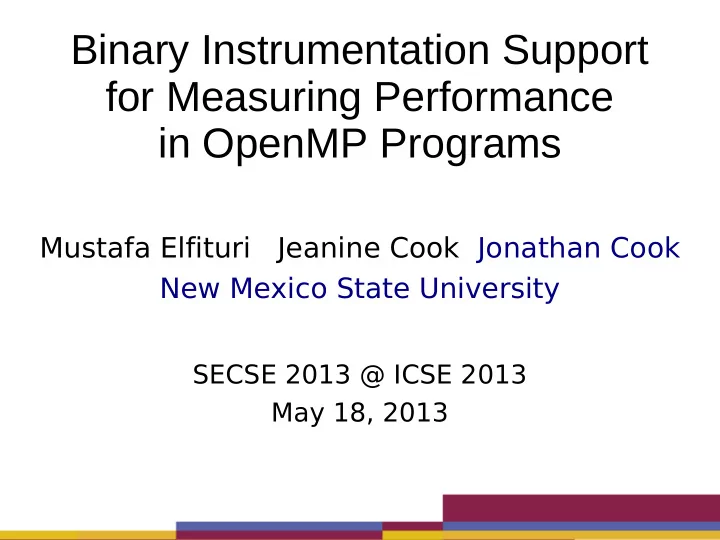

Binary Instrumentation Support for Measuring Performance in OpenMP Programs Mustafa Elfituri Jeanine Cook Jonathan Cook New Mexico State University SECSE 2013 @ ICSE 2013 May 18, 2013
SSCA2 (GraphAnalysis.org) double findSubGraphs(graph* G, edge* maxIntWtList, int maxIntWtListSize) { ... #pragma omp parallel { #pragma omp barrier ... #pragma omp for for (vert=start[phase_num]; vert<start[phase_num+1]; vert++) { ... int myLock = omp_test_lock(&vLock[w]); if (myLock) { ...
OpenMP Tools Making common tools for OpenMP is hard Source level standard does not include monitoring standard E.g., MPI has the PMPI interception standard Commercial compilers have their own private OpenMP tools Opari2 is the only active open tool Uses source translation techniques
Source Translation is Tricky! Harder to fit into a development toolchain Source code in real applications can get very complicated! Modern programming languages are not toy LALR(1) grammars! Tool effort can bog down in managing source instrumentation issues Commercial compiler OpenMP tools use binary instrumentation
Example: Intel Threading Tools “Binary Instrumention for Intel Thread Profiler works better with the OpenMP* Compatibilty Libraries (dynamic version: libiomp5.so or libguide40.so) available via an Intel Compiler. This library has been instrumented for Intel Thread Profiler with the User-Level Synchronization API's. This library is used by default with the Intel Compiler, and can be used with an OpenMP* GCC* compiled application. If a 3rd party OpenMP* library is used, Thread Profiler can still collect data, but Intel Thread Profiler will not comprehend the OpenMP calls - it will be analyzed as a POSIX* application.” http://software.intel.com/en-us/articles/how-to-analyze-linux-applications- with-the-intel-thread-profiler-for-windows
Example: IBM's OpenMP “DPOMP is developed based on IBM’s dynamic instrumentation infrastructure (DPCL). This supports binary instrumentation of FORTRAN, C and C++ programs. The DPOMP Tool was developed for dynamic instrumentation of OpenMP applications. It inserts into the application binary calls to a POMP (Performance Monitoring Interface for OpenMP) compliant library. The DPOMP tool reads the binary of the application, as well as the binary of a POMP compliant library and instruments the binary of the application with calls defined in the POMP compliant library. DPOMP requires DPCL version 3.2.6.” http://www.research.ibm.com/actc/projects/dynaperf2.shtml
Example: BG/P Help Page “The POMP OpenMP Performance Monitoring Interface is a proposed API for enabling programmers and performance tools to obtain information about the performance of OpenMP constructs in an OpenMP program. The IBM compilers and HPCT toolkit provide a prototype implementation of some of the POMP functionality. The full POMP API provides a number of events to report the time spent in different parts of compiler-instrumented user code, and the prototype POMP implementation provides a core subset of the events, sufficient to instrument most OpenMP programs. The current POMP implementation allows profiling of Parallel Regions, WorkShare Do and Parallel Do Loops.” https://www.alcf.anl.gov/user-guides/bgp-pomp
Gnu OpenMP OpenMP Program libGOMP Runtime
OpenMP Parallel Section int main() { … #pragma omp parallel … { … } … } 8048714: call 8048570 <GOMP_parallel_start@plt 8048719: lea 0x14(%esp),%eax 804871D: mov %eax,(%esp) 8048720: call 8048796 <main._omp_fn.0> 8048725: call 8048590 <GOMP_parallel_end@plt>
OpenMP Parallel For #pragma omp parallel ... { #pragma omp for ... for (i=0; I < 100000; ++i) { ... } } ... 80487Fd: cmp %edx,-0x10(%ebp) 8048800: jl 80487f5 <main._omp_fn.0+0x5f> 8048802: call 8048580 <GOMP_barrier@plt>
OpenMP Critical Section #pragma omp parallel ... { #pragma omp critical { ... } } ... 8048807: call 8048620 <GOMP_critical_start@plt ... 8048855: call 80485b0 <GOMP_critical_end@plt>
PGOMP Profiling Interception OpenMP Program PGOMP Interception libGOMP Runtime
Functions Intercepted by PGOMP omp_init_lock GOMP_parallel_start omp_destroy_lock GOMP_parallel_end omp_set_lock GOMP_barrier omp_test_lock GOMP_critical_start omp_unset_lock GOMP_critical_end omp_set_nest_lock GOMP_critical_name_start omp_test_nest_lock GOMP_critical_name_end omp_unset_nest_lock GOMP_single_start
PGOMP Trace Mode Name Return-address ThreadID EnterTime ExitTime ... GOMP_barrier 0x8049875 0 0.030259 0.030260 GOMP_parallel_end 0x8049ab8 0 0.030265 0.030268 GOMP_parallel_start 0x804a5b6 0 0.030320 0.030399 GOMP_barrier 0x804a1a6 3 0.030400 0.030408 GOMP_barrier 0x804a1a6 0 0.030407 0.030408 GOMP_barrier 0x804a1a6 2 0.030399 0.030408 GOMP_barrier 0x804a1a6 1 0.030399 0.030408 ... omp_set_lock 0x804a28b 3 0.030492 0.030492 omp_unset_lock 0x804a2ab 3 0.030497 0.030497
PGOMP Aggregation Mode Name StartAddress EndAddress ThreadID WaitTime ExecutionTime Count GOMP_parallel_start 0x804bee4 0x804bef1 0 0.000 0.199738 1 omp_test_lock 0x804b92e 0x804b983 2 0.00000 0.035917 82350 omp_set_lock 0x804bd94 0x804bdbb 0 0.013750 0.012610 29629 omp_set_lock 0x804bd94 0x804bdbb 1 0.013258 0.012036 28090 omp_set_lock 0x804bd94 0x804bdbb 2 0.012979 0.011716 27149 omp_set_lock 0x804bd94 0x804bdbb 3 0.010780 0.009787 23017 GOMP_barrier 0x804bdfb 0x804bdfb 3 0.018024 0.000000 1631 GOMP_barrier 0x804bdfb 0x804bdfb 2 0.010153 0.000000 1631 GOMP_barrier 0x804bdfb 0x804bdfb 1 0.010693 0.000000 1631 GOMP_barrier 0x804bdfb 0x804bdfb 0 0.008843 0.000000 1631
Performance? > ./plain-ssca2.sh |& grep Time Time taken for Scalable Data Gen. is 0.033507 sec. Time taken for Kernel 1 is 0.001707 sec. Time taken for Kernel 2 is 0.000193 sec. Time taken for Kernel 3 is 0.000530 sec. Time taken for Kernel 4 is 0.208041 sec. > ./pgomp-aggregate.sh |& grep Time Time taken for Scalable Data Gen. is 0.029894 sec. Time taken for Kernel 1 is 0.003377 sec. (20x) Time taken for Kernel 2 is 0.008760 sec. (45x) Time taken for Kernel 3 is 0.010045 sec. (19x) Time taken for Kernel 4 is 2.725435 sec. (13x) Trace output is MUCH slower...
Location issues Optimized code from SSCA2: ... 8049186: call 80488c0 <GOMP_barrier@plt> 80491C4: jmp 80488c0 <GOMP_barrier@plt> 80491D0: call 80488c0 <GOMP_barrier@plt> ... Optimized code from our own test program: 804880E: call 8048660 <GOMP_critical_start@plt 8048860: jmp 80485e0 <GOMP_critical_end@plt>
Conclusion PGOMP == easy instrumentation of Gnu- compiled OpenMP programs Initial prototype results are promising Much work still to do Support OTF (Open Trace Format) Support other tool's data formats (HPCToolkit) Support POMP I/F? PAPI? Others? Provide useful data processing scripts At least some address->code mapping
www.cs.nmsu.edu/please/projects/pgomp www.cs.nmsu.edu/~jcook “Any questions?” prosportstickers.com
Recommend
More recommend